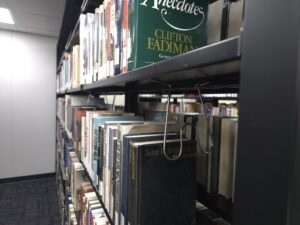“Open” wireless access points denied
Students who use one of the four “open” wireless access points on campus without paying the monthly $10 fee will no longer have this privilege.
According to Eric Mantz, chief information officer, who sent an all-campus e-mail on Feb. 5, explained the decision to only provide “wireless access” to faculty, staff and students. The college will no longer provide “free” Open Internet Access Points.
Students who use one of the four “open” wireless access points on campus without paying the monthly $10 fee will no longer have this privilege.
According to Eric Mantz, chief information officer, who sent an all-campus e-mail on Feb. 5, explained the decision to only provide “wireless access” to faculty, staff and students. The college will no longer provide “free” Open Internet Access Points.
“There have been some laws passed in recent years – in particular, the Communications Assistance Law Enforcement act (CALEA). This law has had an impact on how we are required to conduct network operations at the college,” he wrote.
“On Dec. 14, the Federal Communications Commission released a public notice establishing filing deadlines for CALEA – mandating system security and integrity (SSI) and monitoring reports.
“According to the public notice, ‘facilities-based broadband Internet access and interconnected VoIP service providers subject to CALEA must file,’ which means that exempt institutions are not required to submit these reports,” (www.educause.edu/calea.) he continued
Mantz wrote, “As a college, we have chosen to be an exempt institution, thereby making it so we do not have to file reports on your voice or other network traffic. However, to do this we have to ensure that we have a ‘closed’ or private network – this also extends to our wireless network.”
In order to only provide use to faculty, staff and students, Mantz “has had” all open wireless access points on campus removed. He listed four-open points: Reeves, CBB, Jennifer Leavitt Building and the library. Students, staff and faculty that have used these open access points will need to register their computers with the help desk. Mantz wrote that there is a $10 monthly fee for students. Also, any faculty and staff with non-state owned computers will need to pay the $10 fee.
He listed the monthly fee, along with education and general funds, provide support to maintain the overall wireless system and help insure availability. It involves the access points, wireless controller, RADIUS server, protocol manager and time spent by IT personnel administering the system.
He felt the strength of the system now is that students will get the ability to use almost any chat program, streaming media and voice systems like Skype and Google Talk, along with other services. Most of these services were not available on the open access points.
Mantz felt that most students were familiar with the computer fee, so the loss of Open Access Points should affect very few. But for those who cannot afford the fee for the flexibility of using the wireless system, provisions have been made for them to bring their notebook computers into the Reeves computer lab to connect to a wired port, after verification of student status. These wired ports are currently limited to four connections and have a time limit of 45 minutes if others are waiting.





Comment
So am not very sure about the whole thing where the points are to be closed. I have used all four frequently. I thought it was our privlage to have it. For heavens sake there are signs on campus that let you know where the hot spots are so why it is such a problem? We pay a lump sum that is ear tagged to be student fees why cant that cover the internet cost? Appearently am very confused on the whole article.